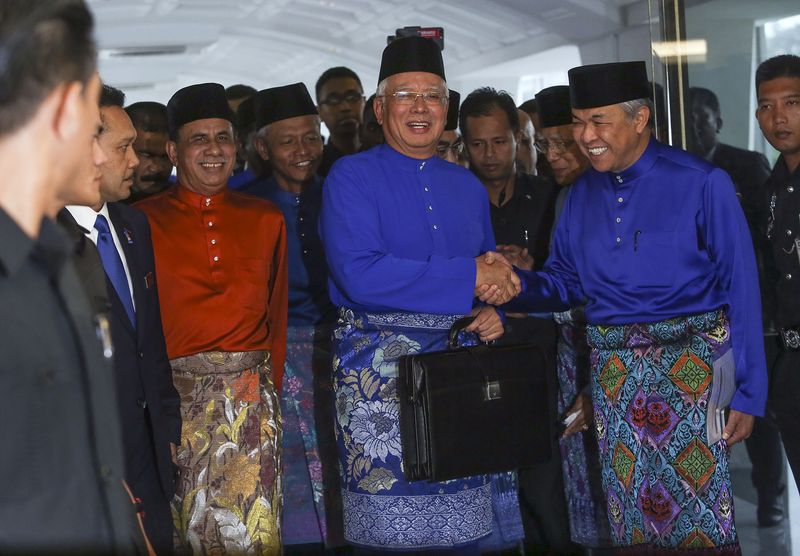KUALA LUMPUR, Oct 30 — Despite announcing a slew of policies to assist urban middle-income earners, observers say the Federal Budget 2018 may not be enough for Barisan Nasional to win back Selangor in the 14th general election.
Pundits suggest that Datuk Seri Najib Razak’s Budget 2018, which includes the removal of two tollgates in Selangor fell short of tackling longstanding issues like stagnant wages among young professionals, corruption and a growing income disparity — key issues for a demographic which is typically anti-establishment.
Describing some provisions in the Federal Budget as “election goodies”, Penang Institute Ooi Kok Hin said the Selangor’s Budget 2018 that is expected to be tabled next week will be an interesting feature to look out for.
“How much this (Federal Budget) will sit well with the voters… I doubt it will have a significant swing [sic].
“Selangor will be having their budget in a week so that’s the key thing to watch, whether and how they will match the federal offer,” the political analyst told Malay Mail Online.
Like Ooi, Ibrahim Suffian said Najib’s move to cut income tax and rollout other measures to address cost of living pressure under Budget 2018 may resonate well with Selangor’s predominantly urban electorate, but won’t be adequate to bag support for a BN takeover of the state.
“I don’t think it goes far enough to temper the stress people feel from largely stagnant wages and rising cost of living for folks in the Klang Valley,” said the director of independent research house Merdeka Center.
“Am not sure if the measures in the budget goes far enough to assuage Selangor voters.
“The cut in tolls and tax breaks are good but am a bit cautious in expecting it will move the political needle significantly towards BN,” he added.
Last Friday, Najib announced a cut in income tax by two percentage points for households earning between RM20,000 to RM70,000, which is estimated to save taxpayers between RM300 to RM1,000 monthly each. The move will also exempt up to 261,000 workers from paying tax.
The BN chairman also promised to dismantle the four decades-old Shah Alam and Sungai Rasau tolls in Selangor to help reduce traveling costs for people in the state. The recent hike in urban tolls around the Klang Valley became a major source of discontent towards the Najib government.
Political analysts and economists say policies unveiled under Budget 2018 were clearly aimed at wooing the middle-class ahead of the 14th general election, which Najib may hold later this year or early 2018, according to predictions.
When contacted, Universiti Utara Malaysia associate professor Mohd Azizuddin Mohd Sani also said BN needs to do more than “a Federal Budget” to convince Selangor voters that BN was a better bet than Pakatan Harapan (PH).
“I think the budget is the starter, there must be more in the pipeline to assist the rakyat in Selangor,” he said.
To the Opposition, some of Najib’s policy announcements allegedly mirrored many of the proposals featured in their Shadow Budget, like abolishing highway tolls for example.
“I think Selangor voters will welcome the policy based competition between BN and PH based on their respective budgets,” Serdang DAP MP, Ong Kian Ming, told Malay Mail Online.
“And Selangor voters are politically mature enough to compare and contrast to see which side provides the more holistic offering...for example, Najib’s budget proposes getting rid of the Batu Tiga toll but Pakatan Harapan proposes getting rid of all tolls,” the DAP leader added.
Another example was Najib’s proposal for a RM200 trust account for babies born between January 1, 2018 to 2022. Ong noted Selangor has long implemented a programme which gives registered children RM1500 by the time they are 18 years old.
“I have confidence that the Selangor voters will choose the better offering and the more mature and inclusive coalition…in simple words, Selangor voters can compare and contrast the BN and PH budgets and choose the better option,” the first-term Serdang MP noted.
Recently the DAP federal lawmaker noted in an article that Selangor voters displayed the most volatile voting patterns; data compiled showed support for BN dipped tremendously in periods of economic and political turmoil.
Ong attributed this to voter sophistication owed to urbanisation and greater access to information.
Up to 91 per cent of the 56 state seats in Selangor are urban and Pakatan Harapan, a coalition made of PKR, the DAP, Amanah and the newly formed PPBM, controls 29 of them.



















